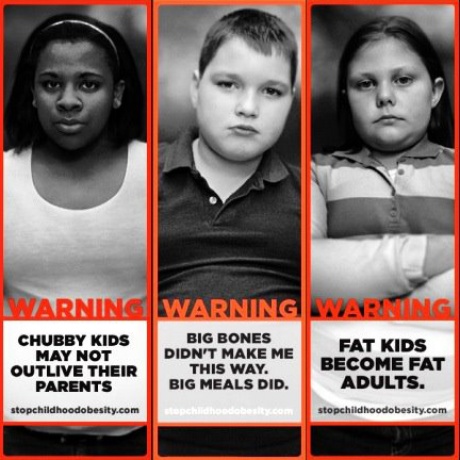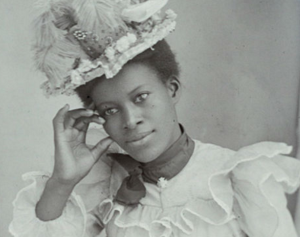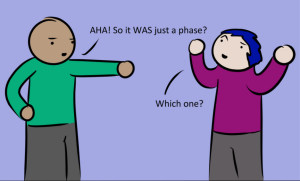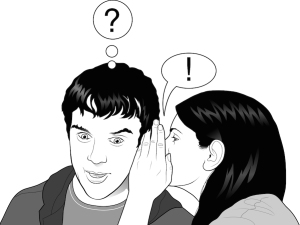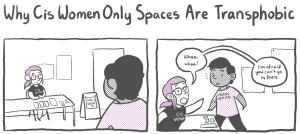Originally published on XOJane and cross-posted here with their permission.
In September 2011, a Georgia organization called Strong4Life launched a multimedia ad campaign aimed at drawing attention to childhood obesity. Setting aside for a moment whether childhood obesity is legitimately a crisis worthy of dramatic action, their approach was controversial.
Strong4Life decided to use actual fat children as cautionary tales in their campaign, which consisted of billboards and print media — examples of which are shown above — and truly soul-wrenching YouTube videos.
The campaign ran quietly for a few months before drawing some nationwide attention earlier this month. Some think that Strong4Life’s “tough” approach — which shows the heartbreakingly-sad faces of fat kids with ominous (and erroneous) captions like “Chubby kids may not outlive their parents” — is necessary to spur people into action.
Opponents believe the campaign to be a horrifying exercise in the fat-shaming of overweight and obese children, one that essentially reinforces the idea that fat kids should be singled out and made examples of.
Curiously, in some cases even people who otherwise agree with the idea that childhood obesity is a dangerous epidemic have stated that depicting these kids in miserable, stark, literally black-and-white tones is not the way to go about it.
Body-shaming is ubiquitous and abhorrent; it happens everywhere, to pretty much everyone, at one time or another. It is especially levied against women, who are shamed for being skinny, for being tall, for being short, for having big boobs, for having small boobs, for having body hair, for being unfeminine, for being too sexy, for being too prudish, for being smart — shamed at some point for being pretty much anything while also being female, including for being ugly (and failing to serve a purpose as a beauty object) and for being pretty (which must mean they are vapid or dumb).
Fat-shaming is a specific variety of body-shaming. It is not the only kind of shaming that takes place, but it is one of the more common ones.
Lots of folks think fat-shaming is perfectly acceptable. More than that, lots of folks think fat-shaming is actually a good thing, because with shame as a motivator, perhaps those darn fat people will stop being so fat.
It doesn’t work, though — shame is not a catalyst for change; it is a paralytic. Anyone who has ever carried extreme personal shame knows this.
Shame doesn’t make you stronger, nor does it help you to grow, or to be healthy, or to be sane. It keeps you in one place, very, very still.
Fat-shaming ought to be self-explanatory, but it’s actually kind of tricky to define. Like most social stigma, the experience of fat-shaming can differ dramatically from one individual to the next.
I can only give you my take on it, which is hardly definitive, but it’s all I’ve got. Here’s a selection of the fat-shaming I’ve experienced over the years:
1. I am at the grocery store, selecting a carton of milk.
An elderly woman stops me and instructs me to buy the skim milk, and says I should put the butter in my cart back and get some kind of reduced-fat fake-butter spread instead, and to try the Egg Beaters instead of real eggs.
“I don’t like seeing young women looking so chubby,” she explains helpfully. “I lost 30 pounds last year on Weight Watchers, you should try it, I bet you could do even better!”
This woman has reminded me that because I am fat, the contents of my shopping cart — and anything I put into my mouth, at that — are open to public scrutiny.
Thinner people buying butter and eggs are not thought to be thinner than me because they eat these things, but I am thought to be fatter because I do.
The implication is that I have not earned the right to buy and eat the foods I want, because my size demonstrates that I can’t be trusted to consume them responsibly — i.e., that I must be eating too much, or eating wrong.
2. I’m using the elliptical trainer at the gym.
A man walks by and gives me an encouraging pat on the shoulder. “GOOD FOR YOU!” he says loudly, pointedly, a little patronizingly.
His intentions may well be positive, but in reality he has drawn attention to the perceived discrepancy between my apparent interest in exercise and the size of my body.
He has pointed out that seeing people who look like me exercising in public is a strange and unfamiliar occurance, an idea rooted in the assumption that fat people are uniformly lazy and unhealthy, and I, as an exception, therefore deserve to be recognized and lauded.
I feel singled out and othered, and very uncomfortable.
3. I am seeing a new doctor.
The doctor immediately tells me that I should be eating a healthier diet and getting more exercise, and that I need to watch my sugar intake because I am “probably prediabetic.”
I tell the doctor, “I’m vegetarian, and I swim at least two miles four days a week, and my fasting blood sugar results have always been excellent.” The doctor looks me up and down and gives me an unvarnished look of extreme skepticism.
Why? Because I am fat, and because she is unwilling to even entertain the possibility that I might eat a balanced diet and keep active, because she has already decided what my habits are based exclusively on having looked at my body, no matter what I may tell her about my life, and (evidently) no matter what my actual test results say.
4. I am out dancing at a club with friends.
I notice a small group of guys at the bar staring at us and laughing. Eventually one of them comes over and starts trying to dance behind me, rubbing against my ass, while his friends laugh uproariously.
When I turn around and tell him to back off, he laughs in my face and says, “Nah, girl, I’d totally fuck you if I thought I could find your pussy in all that blubber!”
These dudes have collaborated to make me feel shamed and unwelcome, and to remind me that it is not OK for fat chicks to dance in a club, because dancing’s only conceivable point is to attract men, and obviously the idea that a fatty like me might attract a man is positively laughable.
5. I am walking briskly to my car in stormy weather.
A gust of wind blows my skirt up in the back, and I try to bat it back down again. Three teenage girls standing outside a nearby apartment building make horrified noises.
“Damn, b*tch, nobody wants to see your cheesy thighs!” one of them yells, and they all laugh.
Apparently, going anywhere in public looking the way I do is unacceptable.

These are some overt examples, but fat-shaming can also take more subtle forms — like gently suggesting that a fatty should skip dessert, or that maybe she would feel more “comfortable” in pants instead of a form-fitting dress.
The frequency with which fat-shaming happens means many fat people go about their lives for years feeling constantly on guard, always prepared for someone to make a comment, to call them out.
It doesn’t have to come from strangers, either; often our families and friends are just as likely to throw out careless fat-shaming comments, and not always with malicious intent.
The trouble with fat-shaming is that it is such an intrinsic part of our culture, it can be difficult to recognize. I’m sure that guy at the gym thought he was offering encouragement.
I don’t doubt the lady in the grocery store was trying to give me friendly advice. But their good intentions do not erase the shaming effects of their unwanted commentary on my body.
If we want to stand in opposition to fat-shaming, we only need remember a few points:
- You can’t tell how healthy someone is just by looking at them.
- You can’t tell how much someone eats or exercises just by looking at them.
- Even if you could, it’s none of your business anyway.
To paraphrase Marilyn Wann: The only thing you can tell for sure by looking at a fat person is the degree of your own bias against fat people.
Removing shame from one social stigma (fatness) does not translate to replacing it onto a non-stigmatized lifestyle (wanting to be thinner).
A stance against fat-shaming is not a matter of trying to make anyone feel bad for enjoying exercise/being vegan/wanting to lose weight.
After all, there are lots of fat people who enjoy exercise immensely. There are lots of fat people who are vegan. There are fat people who do all kinds of things, because fat people exist in a dizzying variety of perspectives, experiences and lifestyles. Just like not-fat people.
It’s even possible to want to lose weight and take action toward that end while still not shaming fat people, or making offensive or hurtful comments about them, or to them. It can be done!
All it takes is that the person trying to lose weight owns their decisions about their bodies at the same time that they respect and validate the rights of other people to do what they like with their bodies, even if some of those people don’t want to diet, and even if some of those people look like… well, like me.
I choose not to diet, not to try to lose weight, for lots of reasons. Given my long history of weight loss (and gain) via dieting beginning when I was nine years old, my body’s dramatic response to starvation (and really, that’s what a diet is) makes it impossible for me to lose weight and still have a life that is at all worth living.
My priorities are different, and I’ve decided that the course best for me is to let my body hang out at the weight it overwhelmingly seems to prefer.
Even for those few who manage to beat the odds and maintain a significant weight loss long-term, the price is constant vigilance, and I can’t live with that degree of food obsession and also be at all mentally stable.
You may not understand this. That’s cool. We don’t have to fully get each other; we just need to mutually respect one another.
I simply think it’s important that you know that you don’t HAVE to diet, no matter your size; you can choose not to, if you want.
Standing against fat-shaming ensures that everyone gets to make private decisions about the state of their body, and that everyone gets to have those decisions respected, whether they decide to lose weight, or to be contentedly fat, or to dye their hair green, or to get lots of piercings or tattoos.
Other people’s bodies are none of your business, not to touch, to judge, or to publicly comment upon.
The Georgia childhood obesity campaign is a troubling example because it turns fat kids into victims responsible for their own stigma. It holds them up as dark, bleak caricatures whose entire existence is defined by their fatness. But those kids laugh sometimes.
They play with their friends. Some of them probably like sports, and some probably prefer carrot sticks to french fries. Some don’t. The world is a diverse place.
Unfortunately, by relying on shame, campaigns like Strong4Life erase all the positivity in these kids’ lives, energy that might be spent encouraging them to get excited about being strong and growing up and learning things and being the best people they can be.
It deters them from feeling good about themselves and feeling good in their own skin, at whatever size they wind up.
The ability to value ourselves no matter what we look like is far more useful than broadening our capacity to be shamed.
That’s my opinion as an unrepentant fatty, anyway. But you come to your own conclusions. Just don’t shame me for mine.
[do_widget id=”text-101″]
Lesley Kinzel deals in body politics, social justice activism, and pop-cultural criticism, usually from a feminist-flavored perspective. She is the associate editor at xoJane and wrote the book, Two Whole Cakes: How to Stop Dieting and Learn to Love Your Body. Follow her on Twitter@52stations.
Search our 3000+ articles!
Read our articles about:
Our online racial justice training
Used by hundreds of universities, non-profits, and businesses.
Click to learn more


